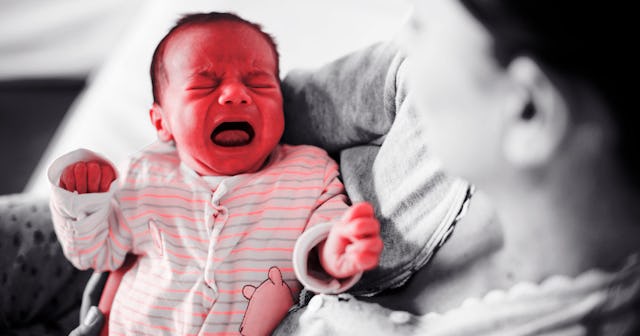My Baby Cried 24/7 For Seven Months Straight, And It Was Horrible

I didn’t enjoy my babies as newborns. It’s a taboo thing to say, but the reality is I had a freaking hard time with my first baby, due to colic (as the term for unexplained, ongoing, incurable crying). It’s not often talked about, it’s traumatic and it was all I knew as normal until baby #2.
When my oldest daughter was a baby, she cried, starting day one. And it wasn’t a normal cry, it was a full out scream, it could go on all day/night and it continued more or less for seven months. There was no reason for it, and it was (and still is) unnerving. At the end of long days, I would drive to Target (my husband with my daughter) and cry in the parking lot, just to escape the noise and get a break.
It made me feel like I had failed her. “I must be doing something wrong. This isn’t normal.” I tried EVERYTHING, soaked in everyone’s tricks and tips, read all the things, tested all the theories. And each time something that worked for someone else didn’t work for us, I felt even more like a failure.
Well-intentioned loved ones would offer suggestions to try and help, but that ultimately fed my self doubt, because there is simply no rhyme or reason to colic. “Your milk isn’t enough, try formula” (but she’s gaining weight and the doctor says her growth is great). “You aren’t strict enough about her routine, try XYZ schedule” (I’ve googled and tried every schedule published, but her crying is unpredictable so no two days are the same and routine means nothing to her). “Get her to bed earlier” (we would start bedtime as early as 5 pm and not get her to calm down until midnight). “Babies only cry when they need something, are you sure nothing is wrong” (I took her to the doctor many times hoping something was wrong so at least I’d have an explanation but they’d check her and find nothing).
njekaterina/Getty
I stopped wanting to even talk about it because it got so hard to explain, and that just made it all the more lonely. I also felt insane when she wouldn’t cry in front of other people and it seemed like I was making the whole experience up. Then I wouldn’t want to have people over, because I felt like I was left with all the “bad” moments and others got my daughter’s few “good” moments. It was a psychological mind F.
Despite logically knowing it was random and unexplainable, that self-doubt dug in deep. Once she did start sleeping, it was a whole new world but the experience stayed with us. She obviously still had (normal, expected) rough nights and I’d freak out thinking it was all coming back. It felt like PTSD. It’s only now, three months into my second baby’s life that the fear has lifted. I didn’t even realize I so deeply carried it with me. But I can now see I approached my younger daughter with that fear; I spent the first two months of her life freaking out every time she cried, terrified it was all happening again, even though she was just being a “normal” baby. I couldn’t separate the normal from the extreme and once again I couldn’t enjoy my baby.
But by month three it’s started to sink in — my second daughter doesn’t have colic, and it was all just luck of the draw. I’m feeding her the same, I’m approaching sleep the same, I’m doing everything the same and I have a completely different baby. I knew this in theory, I even preached “every baby is different” as my top lesson learned after becoming a mom. Now, though, I know it in practice.
I didn’t fail my oldest daughter. I survived. Even reading this back, it all sounds dramatic and like I’m exaggerating it, but it happened and I handled it the best I could.
As with most extreme things in life, it’s hard to explain, and even harder to truly understand, what it’s like to have a “difficult” (re: colicky) baby unless you’ve lived it. People said to enjoy every minute of parenthood and I cried because I felt guilty that I wasn’t enjoying it. I desperately wanted to talk to someone who experienced this and could coach me to the other side. So I put this out there in case you or anyone you know is going through it: You did nothing wrong. You can’t “fix” it. You don’t have to enjoy every moment. It won’t last forever even though it feels like forever. You will survive, and it’s ok to cry. What helped me the most was friends and family (and the pediatrician) simply saying, “I’m sorry. You’re doing a great job.” So in case you need to hear this: I’m sorry. You’re doing a great job.
And while she’s still difficult at times, my colicky baby grew into the most extraordinary toddler.